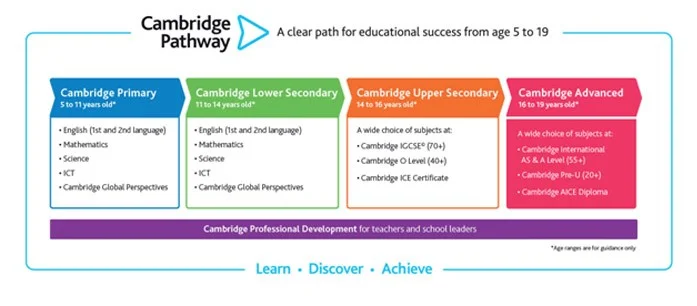
What are schools bringing into their curriculum with Cambridge? We set out three important things we want students to develop – deep subject knowledge, conceptual understanding and higher order thinking skills. Our Cambridge Pathway is a clear framework for progression from one stage to the next.
Deep subject knowledge, conceptual understanding and higher order thinking skills
Cambridge programmes combine an emphasis on mastering subjects in depth, at the same time as developing skills for study and work in the future.
We believe in the intrinsic value of studying a subject in depth. In the words of Andreas Schleicher (2017), Director for Education and Skills, OECD: ‘In top performing education systems the curriculum is not mile-wide and inch-deep, but tends to be rigorous – that is, provides a high level of cognitive demand. It’s also more focused – with a few things that are taught well and in great depth and in a way that is coherent.’
Deep subject knowledge is important in order to develop the ability to solve problems, to apply understanding to new situations and to enable learners to progress to the next stage. It’s especially important at Cambridge International A Level because most learners aspire to go to university, where deep subject understanding is so vital.
Regular consultation with leading higher education institutions (including Harvard, Stanford and Cambridge) has informed our work to make sure our syllabuses for 16 to 19 year olds encourage learners to develop their conceptual understanding: a firm grasp of the subject’s key concepts and developing the skills they need to succeed at university.
We see key concepts as essential ideas that help learners develop a deep understanding of their subject and make links between different aspects. Key concepts can often transform a student’s grasp of their subject, and open up new ways of thinking about, understanding or interpreting the important things to be learned. Good teaching and learning incorporate and reinforce a subject’s key concepts to help learners gain:
- greater depth and breadth of subject knowledge
- confidence, especially in applying knowledge and skills in new situations
- fluency to talk about their subject conceptually and show how different aspects link together
- a level of mastery of their subject to help them enter higher education.
As well as encouraging students to develop higher order thinking skills within subject disciplines – problem solving, critical thinking, independent research, collaboration, presenting arguments – we believe students need to work effectively across disciplines.
Of course this ability is important not only for getting into university but for getting on in life. What’s more, it makes learning and teaching enjoyable and rewarding. And the transferable skills students develop in interdisciplinary programmes like Cambridge Global Perspectives® reinforce their understanding and skills within subject disciplines.
We offer a coherent curriculum with clear progression at each stage, for students aged 5 to 19. We identify clearly what we want students to learn at each stage. At each stage, students build on their previous learning – a ‘spiral approach’ that reinforces what students have learned, while at the same time taking them forward. We design each syllabus with this spiral approach in mind.

We value multilingualism and believe that there are many benefits to being bilingual or multilingual – for students, society and schools. We see every learner as a language learner. Language plays an important role in the school curriculum, either as a subject or as a medium of teaching and learning. Similarly, every teacher is a language teacher, and helps students learn the language they need to succeed in their non-language subjects.
At Cambridge, we support schools and partners to implement bilingual education. Cambridge programmes are often used for the English medium strand of a bilingual programme, and we offer curriculum and assessment for English as a second language for students aged 5 to 16.
Our wide subject range includes a large number of languages – currently, Cambridge IGCSEs are available in more than 30 languages.
Professional development in multilingual education supports our curriculum and assessment offer, with programmes for teaching bilingual learners and courses on language awareness, training around specific language syllabuses and guides for teachers and principals. Our website brings this together in a dedicated bilingual education section.
*The text above has been sourced directly from Cambridge international assessments website.
We understand that, as an organisation, we have an important role to play in helping universities worldwide understand our curriculum and assessments, and what the grades that educators and students work so hard to achieve really mean.
We communicate regularly with universities and government authorities, sharing our expertise in curriculum and assessment but also trying to understand their educational challenges and goals so we can work together to ensure a smooth progression for our students.
The understanding universities have of the demand of our curricula and the rigour of our assessments greatly supports the recognition of our programmes and qualifications around the world. In the UK, all universities accept Cambridge International AS & A Levels in exactly the same way as the UK AS and A Levels. Around the world over 1400 universities recognise our qualifications, including over 550 universities in the US (including all the Ivy League) plus key universities in other major higher education destinations such as Canada, Australia, Singapore, South Africa, Germany and the Netherlands.
We are continually building relationships with universities and other higher education institutions so that we build recognition of our programmes and create yet more opportunities for students.
For example, because the US is one of the main destinations for internationally mobile students, we founded a US Higher Education Advisory Council (HEAC) to advise us on expanding recognition of Cambridge programmes in US universities, and to feed into development of our Cambridge Advanced programmes and make sure they continue to meet the needs of higher education.
The current membership includes representatives from Columbia University, Duke University, Florida State University, University of Maryland, University of Michigan, MIT, Pennsylvania State University, University of Southern California, University of Texas at Austin, University of Virginia, University of Washington and Yale University.
Please click on the following link to be redirected to the Cambridge recognitions database to find the most up-to-date entry requirements for courses you may want to study:
http://recognition.cambridgeinternational.org/
*The text above has been sourced directly from Cambridge international assessments website.
Our Early Years programme offers an opportunity to share knowledge, memories and experiences to last a life time.
The period between 4and 6 is recognised as a distinct stage of learning when children learn best through active play and investigation, which builds on their individual needs and interests.
We know that young children have a wide range of different experiences, skills and interests when they join a setting or school at age three, four or five. They need a well-planned and resourced curriculum to take their learning forward and to provide opportunities for them to succeed in an atmosphere of care and in a place where they feel valued.
Our Early Learning Programme is organised to provide educational development in the following areas
Social and personal learning: Your child will learn to be self –confident, take an interest in things, know what their own needs are, tell the difference between right and wrong, and to be able to dress and undress. They will also learn to take responsibility.
Language learning and communication: Your child will learn to talk confidently and clearly, enjoying stories, songs and poems, hearing and saying sounds, and linking them to the alphabet. With time, they will read and write some familiar words and learn to use a pencil.
Early mathematical understanding: Your child will develop an understanding of Maths through stories, songs, games and imaginative play. They will become comfortable with numbers and with ideas such as ‘heavier than ’ or ‘bigger’. They will be aware of shapes and space.
Knowledge and understanding of the world: Your child will explore and find out about the world around them, asking questions about it. They will build with different materials, know about everyday technology, and learn what it is used for. They will find out about past events in their lives, and in their families. They will find out about different cultures and beliefs.
Creative development: In terms of creative development your child will explore colours and shapes, trying out dance, making things, telling stories and making music.
Health and physical learning: Your child will learn to move and control their body with confidence as well as the equipment that may be involved.
These goals do not put pressure on your child as most of the time they feel they are just playing and having fun. Sometimes they choose what they want to do. At other times they take part in activities that help them learn how to concentrate or develop a particular skill.
Our School’s Primary curriculum year2-year6 is built around the need to provide knowledge, skills and understanding arranged by subject under three areas of study: Environmental Studies, Life Skills and the Expressive Arts. Environmental studies cover the sciences, as well as global perspectives which includes geography and history studies. Life skills cover English , Arabic, French and Turkish languages, Mathematics as well as personal social health education. Expressive Arts include Art and Design, Music and Movement and Physical Education.
We end the primary program with Primary Checkpoint Exam.
https://www.cambridgeinternational.org/programmes-and-qualifications/cambridge-primary/curriculum/
The Middle School is an important bridging period between Primary School and High School. Our Middle School Years 7 – 9 in the Cambridge Curriculum. Students in the Middle School study English as a second language, Mathematics, Sciences that include Biology, Chemistry and Physics, Modern Languages that include Arabic, French and Turkish, Global Perspectives, Art, Music, Physical Education as well as Information Technology and Communication. Students are also given the opportunity to choose from a variety of clubs that most interest them. In the final year of Middle School the students prepare for the Cambridge Checkpoint Examinations.
Cambridge Lower Secondary Checkpoint tests have been designed to assess learners at the end of Middle School. They are available in English as a Second Language, Mathematics, Science and Global Perspectives giving valuable feedback on learners’ strengths and weaknesses before they progress to the next stage of education.
The tests are marked in Cambridge and provide schools with an external international benchmark for learner performance. Each learner receives a statement of achievement and a diagnostic feedback report, giving schools detailed information.
Checkpoint exams are held once per Academic year in April. Students are expected to sit English as a Second Language as well as Science and Mathematics and obtain a certain level of accomplishment in order to qualify for our High School IGCSE programme.
https://www.cambridgeinternational.org/programmes-and-qualifications/cambridge-primary/curriculum/
Cambridge IGCSE™ is the world’s most popular international qualification for 14 to 16 year olds. It is tried, tested and trusted. It is taught by over 4800 schools in 146 countries. The programmes balance a thorough knowledge and understanding of a subject and help to develop the skills learners need for their next steps in education or employment.
The Cambridge IGCSE curriculum offers a variety of routes for learners with a wide range of abilities, including those whose first language is not English.
Starting from a foundation of core subjects, it is easy to add breadth and cross-curricular perspectives. Encouraging learners to engage with a variety of subjects, and make connections between them, is fundamental to our approach.
Cambridge IGCSE helps improve performance by developing skills in creative thinking, enquiry and problem solving. It is the perfect springboard to advanced study.
Cambridge IGCSE develops learner knowledge, understanding and skills in:
- Subject content
- Applying knowledge and understanding to new as well as unfamiliar situations
- Intellectual enquiry
- Flexibility and responsiveness to change
- Working and communicating in English
- Influencing outcomes
- Cultural awareness.
The taught subjects are English as a Second Language, Mathematics at Core or Extended Level and Sperate Sciences (Biology, Chemistry and Physics), Global Perspectives, Arabic, French as a foreign language, Business and ICT. The students are placed into groups based on group orientation .
What is the difference between IGCSE Core and IGCSE Extended?
To take into account differing abilities, there is a choice between Core and Extended curriculum papers in some subjects.
The Core curriculum is within the ability range of a large majority of students. It provides a full overview of the subject and is targeted at students expected to achieve grades C to G.
The Extended curriculum has been designed for the more academically able. It is targeted at those expected to achieve grades A* to E.
The A Level syllabuses prepare learners for university study, which is why universities worldwide value and recognise Cambridge International AS & A Level qualifications.
Cambridge International AS & A Level develops learners’ knowledge, understanding and skills in:
- In-depth subject content
- Independent thinking
- Applying knowledge and understanding to new as well as familiar situations
- Handling and evaluating different types of information source
- Thinking logically and presenting ordered and coherent arguments
- Making judgements, recommendations and decisions
- Presenting reasoned explanations, understanding implications and communicating them logically and clearly
- Working and communicating in English.
Our school offers a number of subjects. This flexibility means we can build an individualised curriculum, and learners can choose to specialise in a particular subject area or study a range of subjects.
Cambridge International A Level is typically a two-year course, and Cambridge International AS Level is typically one year. Most of the subjects that we offer can be started as a Cambridge International AS Level and extended to a Cambridge International A Level.
Students in year 12 select four AS level subjects. At the beginning of year 13 a student can drop one subject with the permission of the High School Principal.
https://www.cambridgeinternational.org/programmes-and-qualifications/recognition-and-acceptance/
You can write to us for anything you want to know about our school.
Click to Ask a Question
It is technically compulsory to use cookies for the operation of our website and the specifications provided. Other various cookies are used for the purposes of imrpoving our website and presenting you with advertisements in your areas of interest, by us or our authorized service providers.

These cookies are essential for our website to function and cannot be turned off in our systems. They are usually set in response to actions you take that amount to a request for services, such as setting your privacy preferences, logging in, or filling out forms. You can set your browser to block these cookies or to alert you about them, but some parts of the site may not work if you do so. These cookies do not store any information that could personally identify you.
Analytical cookies are used to improve your website experience. They help us understand how you use the site (e.g., which pages you visit, how long you stay, etc.). This enables us to enhance the content we provide or make changes to the website’s design.